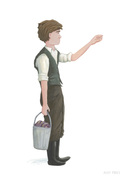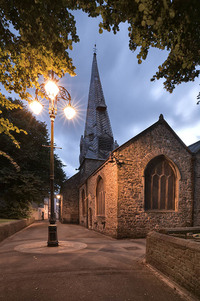|
Christopher Hunt Senior and Junior
|
My Hunt ancestors were living in Barnstaple in the early reign of King Charles I. On the 2nd February 1626 at Westminster Abbey, Charles I had been crowned King of England, he spent most of this time in a power struggle with Parliament. By 1629, Charles had had numerous arguments with his ministers which lead him to abolish Parliament. Charles as king, could do this under what was known as Royal Prerogative, the divine right to rule, but by the middle of the century he was wading into trouble, many people regarding him as insensitive. The West Country, notable Royalist, suffered at this time, Barnstaple changed from Royalist to Parliamentarians and back again no fewer that four times. 1649 saw a great change in the governance of England, in the January of that year the trial of Charles I had begun. The country had seen the estimated deaths from the civil wars as 84,830 killed with another 100,000 dying from war related diseases, leading to the king being held
"guilty of all the treasons, murders, rapes, burnings, spoils, desolations, damages and mischiefs to this nation”
Charles was declared guilty on Saturday 27th January 1649 and sentenced to death he was executed by beheading on the 30th January 1649.
The second generation Hunt ancestor was born just a few days later into country that was governed not by a anointed king, but a lord protector.
"guilty of all the treasons, murders, rapes, burnings, spoils, desolations, damages and mischiefs to this nation”
Charles was declared guilty on Saturday 27th January 1649 and sentenced to death he was executed by beheading on the 30th January 1649.
The second generation Hunt ancestor was born just a few days later into country that was governed not by a anointed king, but a lord protector.
Christopher Hunt senior appears to be the progenitor of our family, he was probably born around 1629 in either Totnes or Exeter three years into the reign ofCharles I, and probably married in 1647/8. The only reference to him can be found in the parish register against that of three of his children Christopher born in1649, Thomas in 1653 and Mary in 1659, we can hazard a guess that there were more than the above named children by the gaps in their birth years. These children would not have made it through infancy. After this point we hear no more of him. His son also Christopher was born in the first week into February and was baptised in the church of St Peters and Mary Magdalene on the 8th of February 1649.
There are no records to show exactly what Christopher did to support his family, he may have been employed in association with the river and its trade but it is highly likely that his occupation was malting or milling. It was probably whilst working in this capacity that he met Mary Fairchild of East Down, as evidence of these trades can be seen in the buildings around that area. Christopher and Mary were married on the 10th August 1671. The couple had six children, Christopher born in 1672, Edward in 1674, Christopher in 1675, Mary in 1678, Thomas in 1679 and Edward in 1684. It is probable that the two elder sons died with a year of birth as it was the tradition of that time to name a new born offspring after is dead sibling. Of the children who made it into adulthood there is no information, although a Thomas and a Christopher Hunt married locally and could well have been sons of Christopher and Mary. Apart from Edward, our ancestor, the rest of the Hunt family sadly fade into obscurity.


